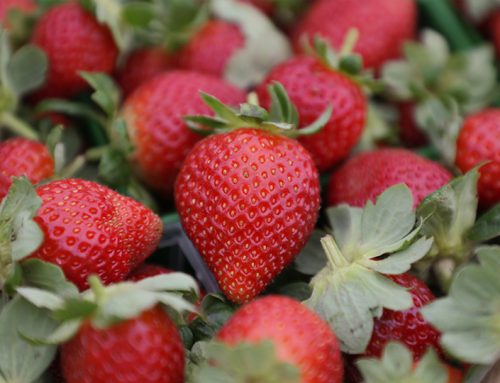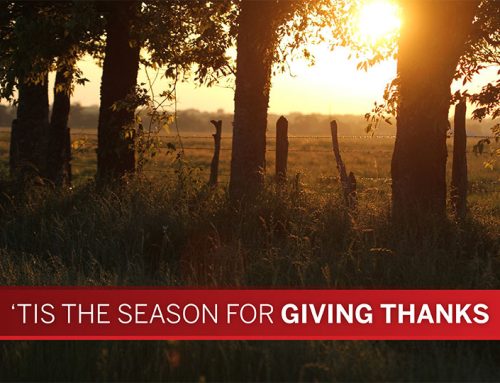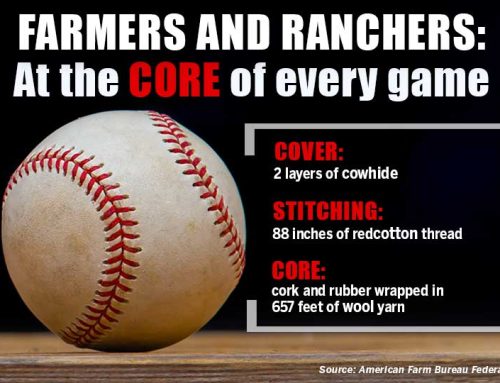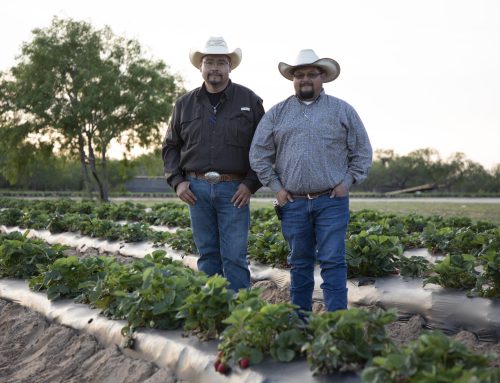By Julie Tomascik
No more GMOs? That’s the route Chipotle announced it’s taking. Because the burrito giant wants to sell food with “integrity.”
I admire that.
But I don’t admire the fear-driven marketing scheme that misleads consumers like you and me. The marketing plan they use 365 days a year.
Chipotle wants you to believe non-GMO foods are better, without citing credible sources.
It’s an emotional marketing twist to take your mind off the truth and safety behind conventionally grown food and focus on the opinions of the company. This just happens to help their bottom line.
And they tout dropping GMO foods from their menu as “responsibly raising the bar.”
What bar?
The bar of U.S. food safety? Standards are already in place and farmers and ranchers raise food to meet those requirements.
So, why would Chipotle take this turn down uncharted territory?
Is it for the good of the consumer? Or to make an extra dollar?
I think they’re leading the conversation with profits in mind, while farmers and ranchers are working to sustain consumers’ growing appetites.
Because GMO crops have taken great strides. They combat disease, create drought tolerance and fend off pests.
All to help farmers do more with less. Less land. Less water and fewer chemicals.
I’m all for transparency and knowing more about the food we eat. But I’m not okay with creating a false sense of security to sell a high-priced burrito.











Kudos for a well-written article! Several things noted in this piece strike a chord with me but especially the line: “All to help farmers do more with less. Less land. Less water and fewer chemicals”.
I’m all for people being informed consumers about the food they eat, but it seems more & more people are just jumping on the bandwagon for the latest perceived trouble. The media & corporations like these just perpetuate that mentality. GMO’s? Gluten? It may be good or bad but by golly I’m jumping on the protest bandwagon just because it’s there…
Thank you for writing this piece, I enjoyed it immensely.
~Taylor-Made Ranch~
Texas
This is great!!! Thank you for advocating!! The public is falling for all of these marketing schemes and is hurting the farmer! Love that your helping get the word out! Thank you!!
I appreciate Texas FArm Bureau but I have to strongly but respectfully disagree with your standard position that GMOs are harmless.
And while I greatly appreciate Texas farmers, volumes and volumes of solid research show the very real threat and harm to humans who consume GMO food products. Again this is not just some alarmist hype but based on solid research which is so evident that more and more nations are banning them. Sadly the mega-corporations (and I am a firm believer in free enterprise) driven more by monetary gain than the well-being of consumers or farmers have censored and tried to hide this factual data from consumers, & I suspect from many farmers and ag-based universities.
I would encourage Texas farmers and related institutional personnel to investigate the facts themselves from reliable alternative sources rather than just accept main stream media or industry skewed facts and data masquerading as legitimate science–which info is controlled by those who profit at the expense and even harm of others-including farmers and consumers.
Hi, Van. We support farmers and ranchers who grow safe food, whether or not it’s conventionally grown. Reputable studies of GMOs have been exhaustive. Farmers, ranchers, agricultural organizations and universities are not sheltered from any research. They, however, only consider reputable studies, and folks in agriculture have investigated the facts themselves.
Van, it’s a pleasure to exchange viewpoints with you. The respect you extend is returned. The money and corporate interests you mention is something we should all think about. I am sometimes disturbed over what I think is a double standard. Monsanto, often demonized is only a medium sized company. Whole Foods is roughly the same size and lobbys heavily against biotech. I think we have to consider they are doing so to gain a market advantage. Yet they seem to get a free pass. And what about Greenpeace, ignoring the evidence and raising huge sums of money while denying life saving and sight saving GMO Golden Rice to kids who desperately need it? Now, my turn to very respectfully disagree with you. There is not any solid research that proves any negative consequences of GMOs. What you’ll find if you scratch the surface of that is – leadership of the project by an anti-GMO activist with an ax to grind, a set of assumptions, not facts, mostly ignoring the scientific method and of course a press release. The scientific community and the more than 2000 peer reviewed independent studies are just overwhelming. This is as close to a slam dunk as science can get. http://www.forbes.com/sites/jonentine/2013/10/14/2000-reasons-why-gmos-are-safe-to-eat-and-environmentally-sustainable/
Google Seralini. His study was squelched by the lame stream media. They drug him through the mud for exposing and proving that gmos are very harmful. Bigpharma and Bigag discredit anyone that disagrees with them. Sad. The statements that the increase crop yield and reduce the use of pesticides is pure fantasy. Laughable. I do t know where this article got its facts. Maybe from those geniuses that developed common core? As an RN and someone who has read about gmos extensively, I can say with 100% certainty that this article is pure propaganda. Perhaps this author works in Monsanto PR department, which serves only to pull the wool over the publics eyes.
Nancy, I have Googled Seralini https://www.sciencebasedmedicine.org/the-seralini-gmo-study-retraction-and-response-to-critics/ many times. I have to wonder if you have, or if you only read those portions of the results with which you agree. With all due respect, I understand this is a passionately held belief, but almost none of it is true – demonstrably so.
Gilles-Éric Séralini only wishes his problem was with the media. Here’s another link http://www.forbes.com/sites/henrymiller/2012/09/25/scientists-smell-a-rat-in-fraudulent-genetic-engineering-study/ to go with the one above that clearly shows the Seralini study to be the laughingstock of the science world. He did demand that reporters who received a copy of the report sign documents agreeing not to seek other verification of the data. That should have been the first clue that the books were cooked.
“Studies” such as this one usually have several things in common. Almost always they are conducted by an anti-GMO activist. What could go wrong with that? Unlike corporate and university studies that must absolutely observe the scientific method, these “studies” often play fast and loose with it. But – they always get the press release right. That’s the most important factor in these “studies.”
With the bt alteration in GMO crops, it is indeed a fact that there is less pesticide being used. http://reason.com/blog/2014/11/06/biotech-crops-use-less-pesticide-study-r GMOs do the same thing with genes that organic farmers do by spraying the bt bacteria itself on their crops.
It’s useful to note the difference between insecticides and herbicides – both of which fall under the catch all term “pesticides.” Insecticide use has fallen in some crops to nearly zero. Roundup is a herbicide and is still widely used and is one of the least toxic chemicals ever used in agriculture and by millions of homeowners. I know farmers who have used no insecticides whatsoever on their sweet corn in years.
As for the research – here are just a few – 2000 or so that are independent and peer reviewed. http://www.geneticliteracyproject.org/2013/10/08/with-2000-global-studies-confirming-safety-gm-foods-among-most-analyzed-subject-in-science/
I guess your passion entitles you to a pass, Nancy, but here’s the thing. Accusing someone of working in the “Monsanto PR Department” for publishing something with which you disagree is pretty lame in and of itself. I have often been accused of being a “shill” for Monsanto. Though the first Monsanto dime has yet to find itself into my pocket – I don’t really think Monsanto needs a defense by me. I work for farmers and I believe in science. That’s my full disclosure.
Here’s something to think about though. Wal-Mart is the nation’s biggest corporation and can do very little to influence reporting on its labor practices. The oil companies, all in the Fortune Top 20 can’t stop climate change regulation. Monsanto, a modest size company, ranks 197th on the Forbes list and somehow manipulates world opinion and regulation at will? That doesn’t really pass the logic test.
Perhaps other companies (Whole Foods – roughly the same size as Monsanto) manipulate this story to gain a market advantage? How about Greenpeace, which raises millions by demonizing this technology?
The thing is the media, and I’ve never found them to be all that lame, is reporting this story fairly now. Once that happens, it can only be written one way. The science is pretty much a slam dunk.
It seems TFB now stands for Texas Conventional Farm Bureau. Not trying to solve the GMO, grass vs grain, or organic debate, but if TFB does not see clearly that there are BOTH types of farms and ranches on your rolls, then you will soon join the AARP model and only represent the conventional farms and ranches. The natural leaning folks will find another voice in agriculture. Commercially speaking, as long as the consumer is asking for a product, Texas ag will fill the need. TFB editors continually trashing non-conventional methods will send me packing. Get off of one side only and start representing Texas.
Hi, Ted. Texas Farm Bureau represents farmers and ranchers of all sizes and kinds, including those who grow organic, conventional, grass-fed, grain-fed and more. Our main priority is to make sure those farmers and ranchers have the opportunity to farm and ranch as they wish.
We are not trash talking anyone. We don’t agree with Chipotle’s fear marketing plan and how they bash conventional farmers. I said I agree with their “food with integrity” mission. I just feel they’ve lost the integrity part. And so do other farmers and ranchers, along with major media.
I agree Texas agriculture will always find a way to meet the needs of our consumers. That will come with technology, conservation and common sense.